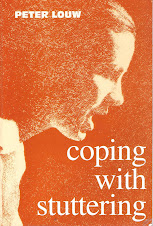When surfing the stuttering websites it always surprises me that so many people who stutter, and apparently also some speech therapists, seem to have little insight in stress, and how it affects stuttering. Even if they are aware of the stress component they don't regard it as a main factor.
The ideas of Hans Selye, the world-renowned authority on tension, has been around for decades, and stress and tension as terms are commonly used in the popular media. Yet for some reason, this awareness has not sufficiently reached the stuttering community.
In my view, tension and stress are CRUCIAL components in stuttering. In fact I believe that you can't understand stuttering if you don't understand tension and stress.
Below follows a very short summary of the chapter on stress in my book. This is only a description of stress and not the section on stress management.
We all know what being tense feels like - those clammy palms as you await your turn to do an oral examination, the accelerated pulse rate, the lump in the throat, the tumbling, panicky thoughts ... We have several names for these responses: nerves, pressure, excitement, panic, stress, tension, anxiety. But what exactly IS tension?
The Canadian biologist Hans Selye has described tension as the rate at which we live at a given moment. All living beings are subjected to a measure of tension, and any intense experience - whether pleasant or not - temporarily increases that tension. This means that in terms of tension, a painful blow and a passionate kiss can have the same effect.
Tension is often the result of the body's response to a THREAT. This 'fight or flight' response, as it is also known, is a mechanism activated to release the additional energy required to counter the threat. The 'fight or flight' response activates a complex biochemical process resulting in an increase in pulse rate, blood pressure and muscular activity. This last feature is of special significance for stutterers - an increase in muscular activity may also affect the vocal fold muscles.
Stress is excessive tension. A few causes of tension:
1) A THREAT, whether real or perceived or potential, whether vague or clear. Eg. unemployment involves a threat to financial wellbeing, and can result in poverty and hunger. Sitting in a traffic jam when late for work also involves a threat (potential job loss).
Any kind of CHANGE can also include a threat (fears of being unable to cope with the new situation). That's why major life changes such as marriage, divorce, new school, new job, emigration, new house, retirement can result in a lot of stress.
Talking to an authority figure (teacher, lecturer, employer, parent, policeman etc.) can result in Authority Figure Stress - also a potential threat, as he/she can use his/her power / authority to your disadvantage.
2) Physical tension - when exhausted, or due to illness.
3) Lack of recreation and entertainment.
4) Environmental - even the weather, humidity, temperature and age can affect tension levels. Office workers have reported often feeling more tense on a Wednesday than a Friday (before the weekend!) and more relaxed in the early morning than later in the day.
5) Subconscious processes.
As some tension is normal and positive, our goal should be to control and not eliminate tension. Note also that what is stressful for Mr A may not be stressful for Mr B. It all depends on the individual's personality, history and experiences, value system etc.
Fluency techniques only work well when a person's stress levels are not too high, and this is probably the reason why many people do not benefit from these techniques - their stress is way too high. They should first attend to their high stress levels before tackling their speech. This is a very important point, and you will hear it many times in this blog and in my book: stuttering management should consist of a FLUENCY TECHNIQUE COMBINED WITH STRESS CONTROL.
Subscribe to:
Post Comments (Atom)






This article made me go and buy book "Why zebras don't have ulcers", a book on stress. Thanks for ideas :)
ReplyDeleteHi Chata
ReplyDeleteThanks for your kind comment! Good idea to get a book on stress.
Regards, Peter